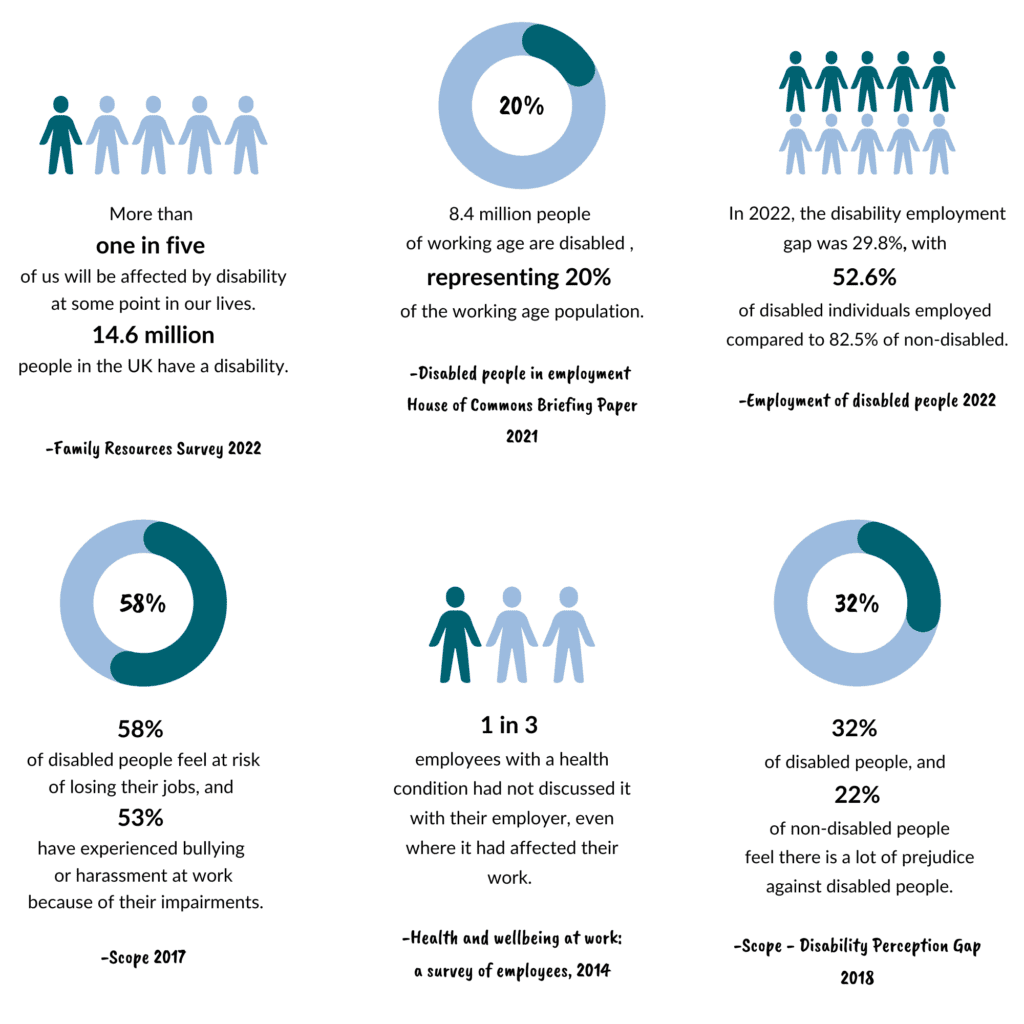
Are you missing out on attracting and retaining a motivated and talented segment of the working population?
Research shows that people with disabilities often demonstrate higher levels of motivation, innovation, loyalty, problem-solving skills and creativity, yet 50% of disabled people in the UK are unemployed or feel hindered by barriers in the workplace.
This comprehensive guide will show you how to make your business disability inclusive, and explore simple changes which can help your business attract, recruit, support and retain disabled talent.

Disability and employment
Let’s start with some facts and figures about disability.

So, what do these statistics tell us?
• Every business has disabled employees – whether they know it or not.
• Any employee can acquire a disability – and with an aging workforce it is becoming more and more likely there will be an increase in the number of people acquiring a disability whilst working.
• There are disabled people who want to work – but it is not always easy for them to find a job as there are barriers in the recruitment process and in the workplace which makes it harder for them.
• Many disabled people feel uncomfortable disclosing their disability – which means employers cannot offer them support or make adjustments, which then increases the risk that they will be absent from or even leave work.

These findings show the need for improved societal and workplace action regarding the recruitment, retention and support offered to disabled employees and the need for more employers to be disability inclusive.
Why should organisations be disability inclusive?
Being disability inclusive involves fostering a culture that embraces diversity, equality and accessibility for employees regardless of their physical or mental abilities, ensuring everyone in the workplace can thrive, and when employees thrive, businesses reap the benefits.
The benefits:
Tapping into a wider talent pool
It expands the talent pool by attracting skilled individuals with disabilities and employees who want to work for an inclusive and diverse business, tapping into a segment of the workforce that might otherwise be overlooked.
Creates a barrier-free working environment
Implementing accessible facilities, technologies, and inclusive policies creates an environment where employees of all abilities can perform their roles effectively and comfortably.


Enhances productivity
Creating a barrier free working environment and ensuring staff and managers have appropriate tools and training will ensure every employee can contribute and enhance productivity.
Improve employee morale and job satisfaction
By fostering a disability-inclusive workplace culture, businesses create an environment where employees, including those with disabilities, feel valued, supported and empowered, leading to higher job satisfaction and improved morale.
Increasing employee retention
Offering reasonable accommodations and support for disabled employees demonstrates a commitment to their wellbeing, contributing to a positive work environment that encourages individuals to stay.
Harnessing different talents
Embracing disability inclusion allows organisations to tap into a wealth of abilities, perspectives and unique problem-solving approaches that individuals with disabilities often bring to the table.


Reducing business costs
Higher employee retention and workplace adjustments help reduce costs of sickness, absence and recruitment.
Enhancing different talents and transferable skills
There are opportunities for mentoring and coaching other staff and managers to enhance their knowledge and skills for broader application.
The benefits don’t stop there. Becoming a disability-inclusive employer also brings the added benefit of valuing disabled customers, offering numerous advantages for your business, such as:
• Reaching a wider market
• Creating better, user-centred products that meet customer needs
• Delivering tailored services that are often better for everyone
• Providing clear and accessible communications
• Improving customer retention, appealing to disabled customers and those who value social responsibility
• Enhancing reputation and making your brand stand out
• Accessing the “Purple Pound,” which is the estimated £274 billion annual spending power of disabled households in the UK.
Attraction and recruitment – how to attract, recruit and retain disabled employees
Now that you recognise the numerous benefits disabled talent can bring to your organisation, let’s explore how you can attract, recruit, and retain these valuable team members.
Attract
The first thing to consider is the first impression—what would a prospective disabled applicant know about the business, and what are they looking for?
They’ll likely visit your website and social media, hoping to find statements about diversity and inclusion, strong values and mission, along with case studies and role models featuring disabled people within the organisation.
It’s really important that your website is accessible and includes a dedicated page about inclusivity and accessibility. Ideally, the site should be compatible with screen reading software, have a clear structure, and offer good navigation tools, such as skip-to-content links. Including subtitles or sign language in videos can also make a big difference.
If your business is already Disability Confident, be sure to display that logo prominently with a link to more information about the scheme.
Next, we need to evaluate whether the business is effectively reaching a disabled audience. While broad platforms like Indeed or Jobcentre Plus can help increase visibility, best practices include using disability-specific sites like Evenbreak or RIDI, and leveraging employment programs such as Restart and the Work and Health Programme.
Additionally, it’s important to clearly communicate that adjustments to the recruitment process can be made. Display a contact number and email address so people can easily ask for assistance.


Adverts, job descriptions and person specifications
It’s important to think about the language used, the duties described, and the skills required. The aim is to attract a diverse pool of applicants, so it’s essential to use inclusive language that welcomes everyone. Keep job descriptions clear and straightforward, avoiding jargon, technical terms, abbreviations, or acronyms.
When outlining duties, focus on what’s essential, frequent, and regular. Mentioning tasks that are only done once or twice a year, which some might find challenging, could discourage potential applicants, when in reality, these tasks could be easily adjusted within the team.
It’s a good idea to specify both essential and desirable skills, so applicants aren’t discouraged if they lack a specific skill. Emphasising generic skills over specific methods, software, or equipment allows candidates to demonstrate their abilities in their own way. This approach encourages fresh ideas and alternative ways of working, which is why attracting disabled talent is so important.
Lastly, be mindful of unconscious bias in your word choices. For example, using terms like “drive” might unintentionally exclude those who can’t drive. Use inclusive language, like “travel for work,” to ensure your job description is accessible and much more inclusive to all.
Applications
Whenever possible, the application process should be accessible. Online processes should work with assistive technology, but alternative ways to apply should be accepted, such as submitting a Word document application or applying by telephone.
All documents used in the recruitment process, including job descriptions, person specifications, and application forms, should be available in an accessible format. It’s important to note that under legal regulations, you can only inquire about disability before making a job offer for specific purposes, such as facilitating necessary adjustments.
So, any questions in the application process should focus on what adjustments are required rather than asking for details about disability.
Assessments / screening
If online screening, tests, or assessments are part of the recruitment process, they may pose a barrier for disabled applicants. Businesses should evaluate the necessity of these screenings or assessments and consider if they can be omitted or adjusted to accommodate disabled applicants.
Businesses participating in the Disability Confident scheme should provide guaranteed interviews to disabled individuals who meet the minimum job criteria, thus eliminating the need for additional screening processes.
Interviews
Once you reach the interview stage, there should be an opportunity for the individual to disclose their disability and request adjustments.
These adjustments could include:
• Providing an accessible location, considering not only wheelchair access but also quiet environments with good lighting (especially important for those who may be lip-reading).
• Adjusting start times to accommodate factors such as avoiding rush-hour commutes or managing medication side effects.
• Shortening the interview duration or incorporating breaks during the meeting.
• Allowing the applicant to use notes, such as their CV or application form, as a memory aid.
• Permitting a supporter to accompany them for moral support and assistance in explaining or rephrasing questions (not to answer on their behalf).
• Providing an interpreter for applicants with hearing impairments.
• Ensuring interviewers use clear language, avoiding jargon, technical terms, or acronyms, and if necessary, rephrasing questions to ensure full understanding.
If you want more information on becoming a Disability Confident employer download our leaflet – Disability Confident Consultancy.
Additionally, our Disability and Health awareness courses will help improve your knowledge and confidence about disabilities in the workplace, click here to find out more!

Upcoming highlights: Don’t miss out!
We are excited to let you know that we have a variety of events due to take place soon, including our ‘free to attend’ webinars that have been specifically scheduled in line with the upcoming national events.
These webinars will help you grow your knowledge and confidence within the subject area, as well as provide you with a recorded copy of the webinar following attendance to enable you to share this with colleagues.
In addition to our webinars, several ‘open courses’ are scheduled over the coming months that still have places available. So, feel free to explore these options and get your place secured to avoid missing out!
Ready to dive into a world of learning and development?
Scroll down to see our full line-up, and book your place today!
| Service Type | Title | Dates | Times |
|---|---|---|---|
| Open Course | Mental Health First Aid Refresher | 4th, 5th September 2024 | 10:00am – 12:00pm |
| Open Course | Suicide First Aid Lite | 26th – 27th September 2024 | 2:00pm – 3:30pm |
| Open Course | Mental Health First Aid Full | 24th, 26th September & 1st, 3rd October 2024 | 09:30am – 13:00pm |
| Open Course | Mental Health First Aid Full | 22nd, 24th, 29th, 31st October 2024 | 09:30am – 13:00pm |
| Open Course | Menopause in the Workplace | 28th, 29th October 2024 | 10:00am – 12:00pm |
| Open Course | Dyslexia Awareness | 30th, 31st October 2024 | 09:30am – 12:00pm |
| Open Course | Disability & Health for Managers | 18th, 19th November 2024 | 10:00am – 12:00pm |
| Open Course | Mental Health First Aid Full | 20th, 22nd, 27th, 29th November 2024 | 09:30am – 13:00pm |
| Open Course | Neurodiversity Awareness for Managers | 21st, 22nd November | 10:00am – 12:00pm |
| Open Course | Mental Health First Aid Full | 10th, 12th, 17th, 19th December 2024 | 09:30am – 14:00pm |
| Open Course | Mental Wellbeing in the Workplace | 28th, 29th November 2024 | 09:30am – 12:00pm |
*Course includes E Learning Modules required to be completed prior to attendance at live sessions

We’re here to help…
If you’re looking for more information about our comprehensive training courses, insightful webinars, or valuable resources, we’re just a message away. Don’t hesitate to reach out for any queries or guidance you might need.
Our friendly training team are always ready to assist you with expert advice and support.
Alternatively, complete the short form on the right and a member of the team will be in touch!


